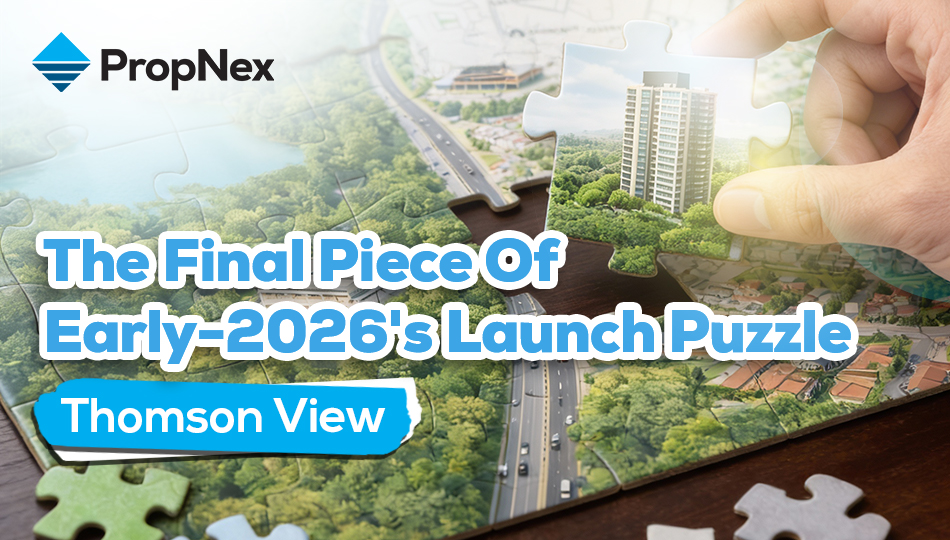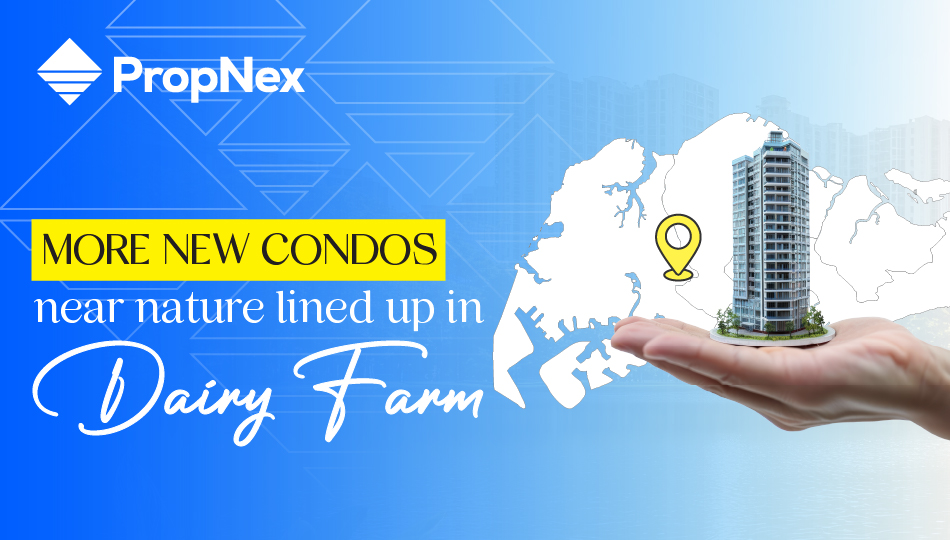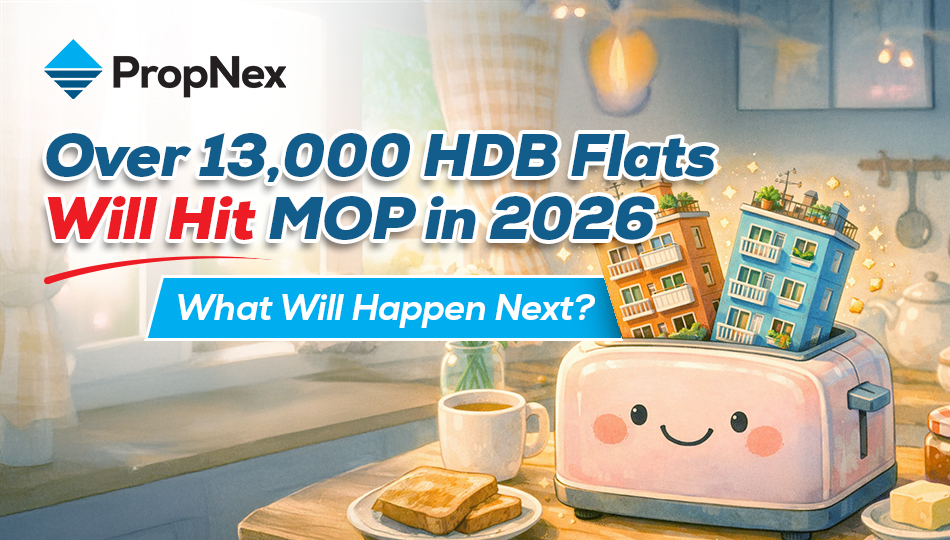Cluster Homes: Straddling The Line Between Condo And Landed?

Imagine living in a home that combines the privacy and charm of a landed property with the convenience and amenities of a condominium. Enter cluster homes - one of Singapore's lesser-sought-after gems in the real estate market. While some see them as the perfect blend of luxury and practicality, others question if they are just a compromise. Let us take a closer look at this unique property type and determine whether cluster homes truly offer the best of both worlds.
Cluster homes are a hybrid property type designed to offer the charm of landed homes with the perks of condominium living. Picture this: your own multi-storey house with a car porch and possibly a garden, yet you share access to swimming pools, gyms, and BBQ pits - all in a gated community. They can be found in both boutique and mega developments.
Cluster homes in Singapore uniquely combine the exclusivity of landed living with the convenience of condominium-style facilities. Offering spacious layouts and shared amenities, they cater to multigenerational families and buyers seeking a hybrid lifestyle. Most cluster homes operate under a strata-title ownership model, with shared maintenance costs for communal areas, though some offer individual land titles for full autonomy. These homes efficiently maximise land use, providing an affordable entry point to landed living compared to traditional landed properties.
In Singapore, cluster homes are usually nestled in suburban neighbourhoods, such as Bukit Timah, Seletar, and Upper Thomson. These areas are known for their quiet, residential charm, making them ideal for families who value privacy, community, and a well-rounded lifestyle. According to investment suite, cluster homes (258) constitute less than 2% of residential properties (17522), making them a rare and niche option.
Exclusive yet shared amenities
One of the biggest draws of cluster homes is their access to shared amenities that rival those of high-end condominiums. Imagine enjoying a morning swim in a pristine pool or hosting friends at a barbecue pit-without worrying about the hassle of maintenance. These amenities, often located within the compound, make cluster homes perfect for families with young children or anyone who loves a vibrant lifestyle.
Unlike traditional landed homes where such luxuries require significant investments in personal upkeep, cluster homes make them accessible and hassle-free.
Lower price point
Cluster homes are an affordable alternative to traditional landed properties, offering similar living spaces at a fraction of the cost. As of October 2024, the average psf of cluster homes is at $898, while the average psf of landed homes is more than double at $1,993. This lower entry cost makes cluster homes an attractive option for aspiring landed homeowners who aren't ready to commit to the high prices of traditional landed properties.
Community living with a touch of privacy
Cluster homes bring the best of community and privacy. The gated setup fosters a safe, neighbourly environment, with opportunities to socialise in shared spaces like pools or gyms. At the same time, you can retreat to your private sanctuary when you need peace and quiet. This balance is especially appealing for families with children, as it creates a supportive, family-friendly atmosphere.
Maintenance convenience
Owning a landed property often comes with the burden of maintaining your garden, roof, and even drains. Cluster homes, on the other hand, take care of these concerns. Maintenance of communal areas and facilities is managed by a professional team, sparing you from the headaches of home upkeep while preserving the pristine environment.
Limited land ownership
One drawback of cluster homes is that you don't own the land outright. Instead, the land and communal areas are shared among all the owners in the development. For property purists and long-term investors, this shared ownership might dilute the appeal, as the potential for land value appreciation is less pronounced compared to owning a freehold landed home.
Space efficiency
While cluster homes provide a landed living experience, the actual land and floor area may be more compact than standalone landed properties. A typical cluster home might offer 2,500-3,000 sq ft of built-up area, but this is often split over multiple floors, reducing the efficiency of the living space. In comparison, a traditional landed property in a similar price range might provide more expansive single-level living spaces.
Shared facilities
While shared facilities are a boon for many, they can sometimes feel less exclusive. For instance, during weekends or festive seasons, facilities like pools and BBQ pits might be in high demand, leading to scheduling conflicts or overcrowding. This could be a downside for those who prioritise exclusivity in their lifestyle.
Resale market challenges
Cluster homes cater to a niche audience, which can make them less liquid in the resale market. Data shows that cluster homes appreciate more slowly compared to traditional landed properties, partly due to their strata title ownership and narrower buyer pool. Potential investors should factor this in when considering long-term returns.
Land ownership
When you purchase a cluster home, you own a strata title. This means you share ownership of the land and communal facilities with other homeowners in the development. While this arrangement keeps prices relatively affordable, it limits the full capital appreciation potential tied to land ownership - a key factor for property investors.
With landed properties, you enjoy full ownership of the land. This is highly sought after in land-scarce Singapore, where owning a piece of land signifies prestige and offers significant long-term value. Landed properties come in various forms, such as terraces, semi-detached, and Good Class Bungalows (GCBs) - the crme de la crme of Singapore's landed home. Landed properties are often freehold or have long leasehold tenures, making them an attractive asset for wealth preservation.
Learn more about what makes GCBs so special here.
That being said, cluster homes offer a distinct advantage: some developments are granted special permission for foreign ownership without requiring further approval from the Land Dealings Approval Unit (LDAU). This is a significant benefit, as foreign buyers often face strict restrictions when it comes to purchasing landed properties in Singapore. Cluster homes provide an accessible option for expatriates and foreign investors to enjoy the exclusivity and spaciousness of landed living, along with shared amenities that enhance convenience and community.
Privacy levels
While cluster homes offer privacy within your individual unit, the shared facilities mean you will still encounter neighbours regularly. This setup provides a balance between exclusivity and community living, but it may not satisfy those who desire complete seclusion.
Privacy is one of the biggest advantages of landed homes. With no shared walls, facilities, or space, you can enjoy complete autonomy. Whether it is hosting a private pool party or relaxing in your backyard, landed homes cater to those who value exclusivity.
Maintenance responsibilities
Maintenance is a breeze for cluster homeowners. A management team handles communal spaces, facilities, and landscaping, freeing you from the burden of upkeep. You only need to manage the interior of your own home, making it an ideal choice for those who prefer a hands-off approach to homeownership.
With great independence comes great responsibility. Landed homeowners must handle all maintenance tasks themselves, from repairing the roof to cleaning the gutters. While this allows you to personalise your space fully, it also requires more time, effort, and financial investment.
Price point
Cluster homes are significantly more affordable than landed properties in the same location. According to statistics, cluster homes may cost up to 18-83% less per square foot than their landed counterparts. For example, a cluster home in D19 might be priced at $877 psf, while a landed home (terrace) in the same district could exceed $1,900 psf. This makes cluster homes an ideal option for those aspiring to landed living but operating on a tighter budget.
District | Cluster Homes (psf) | Landed Homes (psf) | Percentage Difference |
|---|---|---|---|
D28 | $983 | $1,383-$1,958 | 34-66% |
D21 | $941 | $1,612-$2,265 | 53-83% |
D19 | $877 | $1,282-$1,975 | 38-77% |
D15 | $1,055 | $1,937-$2,397 | 59-78% |
D13 | $1,181 | $1,425-$2,450 | 18-70% |
Source: Investment Suite
The high cost of landed properties reflects their exclusivity and prestige. They are often priced out of reach for most buyers, particularly in prime districts. However, for those who can afford them, the potential for higher capital appreciation and the pride of ownership can justify the premium.
Community setup
Cluster homes foster a gated-community lifestyle, where residents share amenities like swimming pools, gyms, and BBQ pits. This setup encourages interaction among neighbours and is especially appealing to families with children who can benefit from shared play areas and social opportunities.
Landed homes are standalone properties, providing maximum independence. While this setup ensures privacy, it also means there is less opportunity for community engagement unless you actively reach out to neighbours.
Feature | Cluster Homes | Landed Homes |
|---|---|---|
Land ownership | Shared (Strata Title) | Full individual ownership |
Privacy | Moderate (Shared facilities) | High (No shared spaces) |
Maintenance | Professionally managed | Owner's responsibility |
Price point | 30-40% lower | Higher |
Community setup | Gated, communal living | Typically standalone |
Cluster homes are not for everyone, but they offer a unique value proposition for specific types of homeowners. Let us take a closer look at who benefits the most from these properties.
Families
Cluster homes are particularly appealing to families, especially those with young children. The gated community setup provides a safe and secure environment for kids to play freely. The shared amenities in the development create opportunities for family bonding and social interaction. For parents juggling work and home responsibilities, the hassle-free maintenance of cluster homes is another big plus.
Upwardly mobile professionals
Professionals climbing the career ladder and seeking a step up from condominium living often find cluster homes the perfect solution. These homes offer the prestige of landed property living without the hefty price tag. They are also ideal for those who want a private space to unwind after work while still having access to communal facilities for recreation or hosting gatherings.
Luxury enthusiasts on a budget
For those who dream of owning a landed property but are constrained by financial considerations, cluster homes present an attractive alternative. With prices significantly lower than traditional landed properties, buyers can enjoy a spacious, luxurious living environment at a more affordable price, making them a stepping stone for aspiring landed homeowners.
Expats and relocation buyers
Expatriates relocating to Singapore often gravitate toward cluster homes due to their unique blend of privacy and community. Cluster homes strike a balance between the familiarity of detached houses common in many Western countries and the communal setup popular in Asia. They are also often located in suburban areas, such as D28, D27, D22, D21, D19, and D15, and with access to international schools, making them an ideal rental choice for expat families.
Investors
Although the resale for cluster homes is extremely niche, these properties can still attract buyers who appreciate the exclusivity and hybrid nature of the housing type. Investors looking for stable rental income may find cluster homes an attractive option, particularly in neighbourhoods with strong rental demand.
The cluster home market occupies a unique niche within Singapore's residential property landscape. While relatively small, it has its distinct drivers and characteristics worth exploring.
Limited supply, high exclusivity
Cluster homes are a rare breed in Singapore, comprising less than 2% of total housing stock, as mentioned at the start of this article. This scarcity, combined with their hybrid appeal, has positioned them as a niche product for discerning buyers who seek something between condominiums and landed homes.
There are also rarely new cluster home projects in Singapore due to their niche demand, keeping the supply limited. As such, existing cluster homes often enjoy steady interest from specific buyer groups, particularly families and expatriates.
Price and value trends
The price of cluster homes has been relatively stable compared to landed properties. While they are much less expensive than landed properties when compared within the same area, their resale value tends to appreciate at a slower rate. For example, if we compare cluster and landed homes in Bukit Timah, looking at the last 5 years:
Cluster homes' average annual appreciation in Bukit Timah is approximately 0.92% while landed homes appreciate at 7.87% per year.
Based on the statistics above, cluster homes' markets have been highly volatile, with significant losses during some periods that are also offset by strong rebounds in others. While their affordability appeals to certain buyers, the overall flat growth suggests they are more suited for lifestyle buyers rather than investors looking to make significant profit.
On the other hand, landed homes have demonstrated steady and reliable price growth with fewer fluctuations, making them a profitable long-term investment. Their consistent appreciation and high demand cement their position as a premium property type.
That being said, it is also due to the nicheness of cluster homes' market - small transaction volume. Cluster homes still show resilience during market slowdowns, as their lower price point keeps them appealing to budget-conscious buyers.
Rental market performance
Cluster homes offer competitive rental yields, catering to renters seeking a spacious living environment. The average rental price for cluster homes stands at $3.14 psf, with prices ranging from $2,100 to $31,000 per unit, putting them in a unique position between condominiums (average $5.18 psf) and landed properties (average $3.55 psf).
Despite their niche appeal, cluster homes have a modest rental volume of 642 units, compared to other residential types which are in the thousands, reflecting their exclusivity and limited supply. They are particularly attractive in suburban areas with proximity to international schools, making them a solid option for expatriate families looking for long-term leases.
Cluster homes are a unique option in Singapore's housing market, offering the privacy and spaciousness of landed homes with the modern conveniences of condominium living. For families and professionals upgrading from condos, they strike a practical balance between exclusivity and affordability. With features like shared amenities, lower maintenance responsibilities, and gated-community living, they appeal to those seeking a blend of luxury and convenience.
While their resale market can be rather niche, cluster homes remain an attractive option. Ultimately, the decision boils down to individual priorities: Do you value community living, shared facilities, and lower maintenance? Or are you drawn to the independence and long-term appreciation of full land ownership? They are a compelling middle ground for homeowners looking to enjoy the best of both worlds.
Thinking of whether a cluster home fits your lifestyle? They are a fascinating blend of exclusivity, convenience, and community living. If you are curious to learn more or want to explore your options, feel free to reach out to our team.
Understanding your housing choices is the first step to making the right move - take your time and when you are ready, we are here to guide you.
Views expressed in this article belong to the writer(s) and do not reflect PropNex's position. No part of this content may be reproduced, distributed, transmitted, displayed, published, or broadcast in any form or by any means without the prior written consent of PropNex.
For permission to use, reproduce, or distribute any content, please contact the Corporate Communications department. PropNex reserves the right to modify or update this disclaimer at any time without prior notice.














